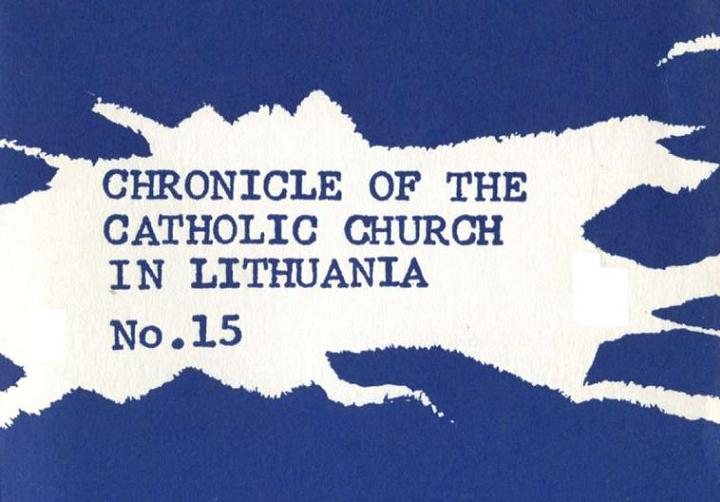
CHRONICLE OF THE CATHOLIC CHURCH IN LITHUANIA
A Translation of the Complete Lithuanian Original, LIETUVOS KATALIKŲ BAŽNYČIOS KRONIKA NR. 15 Documenting Today's Struggle for Human Rights In Soviet-Occupied Lithuania
Translation Editor: Rev. Casimir Pugevičius
Published by the Lithuanian R. C. Priests' League of America 351 Highland Boulevard Brooklyn NY 11207
Printed by Sisters of Immaculate Conception © Lithuanian Roman Catholic Priests' League of America 1977 Putnam, Connecticut
INTRODUCTION
Since 1972, the Chronicle of the Catholic Church in Lithuania has scrupulously documented the struggle for human rights in that Soviet-occupied country, on the eastern shore of the Baltic Sea.
Laboriously typed in carbon copies, and passed secretly from hand to hand, the Chronicle is ultimately smuggled out to the western world, where it has caused a sensation.
The Chronicle describes the heroic efforts of some 3 million Lithuanians, 85.5% Roman Catholics of the western rite when the country was forcibly annexed by the Soviet Union in 1940, to preserve the faith of their forebears.
It is a story of six dioceses with no resident bishop and no normal contacts with the outside world, trying to maintain traditional ecclesiastical forms of administration. In reality, all decisions are made by the state-appointed Deputy for Religious Affairs—an atheist.
It is the story of the struggle between clergy who have decided for one reason or another to cooperate with the regime, and stubborn dissident priests and faithful insisting on their rights under the Soviet Constitution, the Universal Declaration of Human Rights, and Natural Law.
It is the record of heroic parents of children, who insist on rearing their offspring in the Catholic Faith, against all efforts by teachers and government youth leaders to dragoon youngsters into various Communist youth organizations.
The Chronicle is the record of mere school children risking the wrath of atheistic teachers and even of Security police, to go to church or sing in a choir.
Constantly harassed in one way or another, the religious believers of Lithuania find themselves in the position of second-class citizens.
Denied access to mass media to tell their story, or to religious literature to nourish their faith, the Catholics of Lithuania find it necessary to photo-copy such religious literature as they can lay their hands on.






